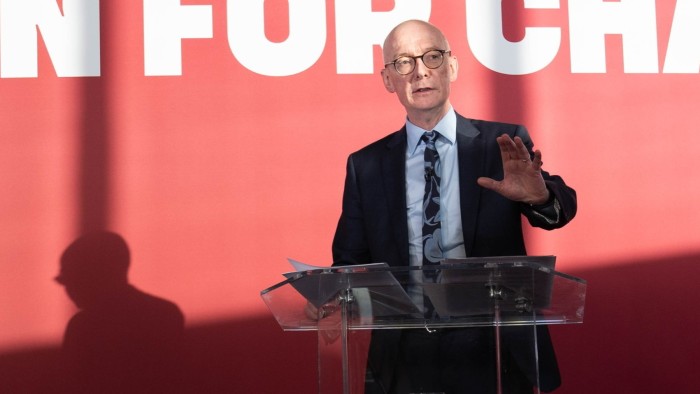Unlock the Editor’s Digest for free
Roula Khalaf, Editor of the FT, selects her favourite stories in this weekly newsletter.
Cabinet Office minister Pat McFadden’s half-joking call on Monday for “weirdos and misfits” to shake up the civil service made him the latest senior Labour figure to echo the philosophy of arch-disrupter Dominic Cummings.
In a speech urging change in Whitehall, McFadden said: “You might remember a few years ago, there was a call for weirdos and misfits in the system. Well, whatever term you want to use, we do want innovators and disrupters and original thinkers.”
A striking array of senior Labour ministers and aides appear to share some of the analysis of the state put forward by Cummings, the maverick Number 10 adviser who spectacularly fell out with then Conservative premier Boris Johnson in late 2020.
At the start of that year, Cummings used his blog to invite “an unusual set of people with different skills and backgrounds to [apply to] work in Downing Street”, among them “data scientists and software developers” and “weirdos and misfits with odd skills”.
Collectively dismissing officials as “the blob”, Cummings was a harsh critic of Whitehall and characterised the civil service as a source of inertia, or worse, active resistance to ministerial direction.
Last week Sir Keir Starmer voiced similar concerns, suggesting that officials were content with failure and warning: “Too many people in Whitehall are comfortable in the tepid bath of managed decline.”
The prime minister said publicly what a string of his colleagues have complained about privately: that they often find the civil service slow to respond, bogged down in procedure, demoralised or lacking in innovation.
“Many secretaries of state are struggling to get the machine moving,” said Harry Quilter-Pinner, executive director at left-leaning IPPR think-tank. “The quality of what they get back from the civil service is very mixed.”
In Whitehall itself, where staff surveys have revealed fragile morale and exasperation over chronic pay issues, Starmer’s remarks triggered anger at the highest echelons.
“Several permanent secretaries were aghast — it came as a real surprise. I think it was a stupid attempt to embrace the Cummings-era ‘blob’ rhetoric without understanding the impact it would have,” one senior Whitehall figure said.
Starmer’s strong language on the need for civil service reform was not reflected in his decision to choose Sir Chris Wormald, Whitehall’s longest-serving permanent secretary, as the next cabinet secretary and most senior mandarin.
One government official said: “We didn’t want a chaos merchant. You need someone there who understands the system and what needs to change and has the confidence of others around the table.”
However, other Labour figures fear a “mismatch” between the scale of the problems the government has identified in the public sector and the ambition of the solutions it has offered.
Some senior government officials admit that the party was “over-cautious in opposition” and was itself not well prepared for government. One said: “That’s our fault, not that of the civil service.”
However there have also been grumbles that civil servants conducted insufficient work to prepare options for incoming Labour ministers from the party’s manifesto.
Such an excuse has been viewed dimly in some quarters. Simon Hoare, Tory chair of the House of Commons public administration committee, remarked: “In essence the civil service is an implementation body — and politics is supposed to be the crucible of ideas.”
On Monday McFadden sought to take some of the heat out of the debate, praising “hard-working and diligent civil servants” who “want to do well for their country and for the public”.
He told an audience at a UCL campus in east London: “The people are good, but the systems and structures that they work in are too often outdated and make it hard for them to deliver.”
He also highlighted his plan to deploy “data and digital people” alongside policy officials and local staff to drive public service reform, and to increase appetite within government for risk and experimentation.
Such a strategy again echoed the former Downing Street aide’s plans to drive innovation and Cummings himself seized on McFadden’s remarks, writing on X: “More ‘Cummings was right’ from No10 today.”
Starmer’s allies said the prime minister was impressed by the data science unit at the heart of government known as “10DS” that Cummings set up, which will pioneer some of the changes set out by McFadden.
“A lot of the Cummings’ critique is pretty conventional,” said Alex Thomas, programme director at the Institute for Government think-tank.
He added: “Does the government need clearer lines of accountability? Yes. Does it need more specialist expertise? Yes. We [the IfG] have said all along that his diagnosis wasn’t wrong, but by blowing everything up and alienating people, that’s what led to failure.”



